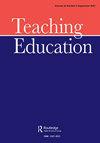Which class will I be assigned to next year?
IF 1.1
Q2 EDUCATION & EDUCATIONAL RESEARCH
引用次数: 0
Abstract
ABSTRACT Mathematics teacher training is intended to inculcate teaching skills for success in all learning levels. The aim of this study is to examine the questions: Which factors contribute to the successful assignment of teachers to learning levels? Can teachers teach all levels or only some? The findings should help to clarify which factors to consider for the proper assignment of teachers. Three hundred and twelve academic mathematics teachers were asked about their suitability to teach low and high levels of mathematics, feelings of teaching efficacy, attitudes toward high- and low-achieving students and efficacy and preferences in teaching underachievers. Extensive information was collected about their mathematics education. As most high school students are tested at the low level, most mathematics teachers are assigned to this level. Many more mathematics teachers feel suited to teach the high level rather than the low level. Factors explaining the success of teachers in the various levels were assessed. Academic educational level was not among the factors. The hypothesis is examined that new ways of thinking are required for developing teacher efficacy for lower mathematics levels. It is doubtful whether solely expanding teachers’ academic education will attain this objective. Principals are offered educational considerations for the optimal assignment of teachers.明年我将被分配到哪个班?
摘要:数学教师培训旨在向所有学习水平的学生灌输成功的教学技能。本研究的目的是检验以下问题:哪些因素有助于教师成功地达到学习水平?教师可以教授所有级别的课程还是只教授一些级别的课程?研究结果应有助于澄清教师的适当分配应考虑哪些因素。312名学术数学教师被问及他们是否适合教授低水平和高水平的数学、教学效能感、对成绩优异和成绩较差学生的态度以及对教学成绩不佳学生的效能和偏好。收集了大量关于他们数学教育的信息。由于大多数高中生的测试都是低水平的,所以大多数数学老师都被分配到了这个水平。更多的数学老师觉得适合教授高水平的数学而不是低水平的数学。对解释各级教师成功的因素进行了评估。学历不在影响因素之列。这一假设被检验为,需要新的思维方式来培养低数学水平的教师效能感。仅仅扩大教师的学术教育是否能达到这一目标是值得怀疑的。为校长提供最佳教师分配的教育考虑。
本文章由计算机程序翻译,如有差异,请以英文原文为准。
求助全文
约1分钟内获得全文
求助全文
来源期刊

Teaching Education
EDUCATION & EDUCATIONAL RESEARCH-
CiteScore
3.80
自引率
6.20%
发文量
15
期刊介绍:
Teaching Education is an interdisciplinary forum for innovative practices and research in teacher education. Submission of manuscripts from educational researchers, teacher educators and practicing teachers is encouraged. Contributions are invited which address social and cultural, practical and theoretical aspects of teacher education in university-, college-, and school-based contexts. The journal’s focus is on the challenges and possibilities of rapid social and cultural change for teacher education and, more broadly, for the transformation of education. These challenges include: the impact of new cultures and globalisation on curriculum and pedagogy; new collaborations and partnerships between universities, schools and other social service agencies; the consequences of new community and family configurations for teachers’ work; generational and cultural change in schools and teacher education institutions; new technologies and education; and the impact of higher education policy and funding on teacher education. Manuscripts addressing critical and theory-based research or scholarly reflections and debate on contemporary issues related to teacher education, will be considered. Papers should attempt to present research, innovative theoretical and/or practical insights in relevant current literature and debate.
 求助内容:
求助内容: 应助结果提醒方式:
应助结果提醒方式:


